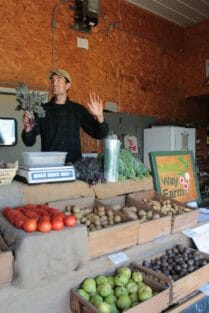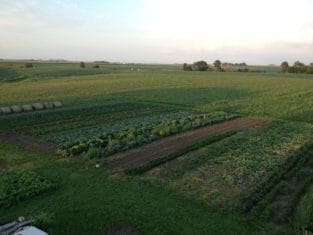What’s Your Work Worth
Starting a farm business can be challenging, fulfilling, emotionally and physically exhausting, scary, stressful, satisfying and rewarding. So why do it? Why is there that strong pull to start farming? Maybe it’s about making a long time dream a reality. It could be the satisfaction from sharing the fruits of your labor with your customers. Possibly it’s the love of working with the gifts of nature.
But show me the money.
If you are serious about starting a career in farming, all that nature and dreaming is great, but it doesn’t pay the bills. So, what do you do when you’re just starting out and the farm business isn’t quite in the black yet? Many have off farm jobs to pay living expenses, or depend on a partner’s income until the farm can start to generate its own revenue. Both are extremely helpful in the start-up years and likely necessary. However, if you intend to farm full time or at least most of the time, it’s very important from the beginning of your business to plan for the cost of your labor. Most people don’t work for free and neither should you. If your business can’t bear the cost of paying for your hard work within a reasonable amount of time, then it’s not a business. It’s a hobby. And that’s ok, as long as you are ok with it.
The reason for this advice isn’t just so you have personal income to pay your home bills, it goes much deeper than that.

Jordan realized finally paying himself made him more keenly aware of his business finances. It was also a motivator to keep up the hard work.
Jordan Scheibel of Middle Way Farm in Grinnell and a 2014 Savings Incentive Program graduate, gave a candid presentation of his business plan during our 2015 annual conference. During his presentation, Jordan mentioned something that caught my attention as well as the three business plan reviewers on the panel. He stated he started to draw a paycheck from his CSA business because, quite frankly, he needed a little income and the business could allow giving a little. However, what he realized was this:
“I quickly realized that actually drawing money from the business on a regular basis made me feel like I was getting some sort of return on my labor, even if it was less than minimum wage. It also made me more aware of how the business was really doing financially and whether I was producing enough income to actually make a living. It made me more willing to hustle and try to produce more income because I felt like I was personally benefiting from it, rather than just building something up that I would benefit from in the near future.”
When Jordan started to pay himself, even just a little, he was more aware of the financial standing of his business and he felt rewarded for his hard work. Positive reinforcement can have great results for future behavior. As Jordan noted, he felt motivated to continue working on his business, maybe even a little harder than before. Part of the “sustainable” in a “sustainable business” is the business owner themselves. You need to do something to feel appreciated and sustain your drive to keep working at your business. And you need to be intimately aware of you business’ ability to fulfill that deserved appreciation. Deb Downy of Right Teaching – Education for Small Businesses and a 2015 annual conference review panel member, agreed with Jordan’s decision to pay himself. She mentioned it’s a good business strategy to make a plan to pay yourself early on in your farming career for the same reasons Jordan discovered. It doesn’t have to be much, but it should be something.
Jordan’s advice for other beginners? “I would suggest that all beginners should consider building personal income into their business from day one, even if it’s nominal at first (a hundred dollars a month, or a few hundred dollars at the end of the season). We also need to think about what expenses could be considered legitimate business expenses that we can write-off that also benefit us personally – laptop, printer, cell phone, work clothes and shoes, snacks for farm, etc.” (Tax advice we will have to tackle at another time!)
If you are a beginner or a seasoned farmer, I am interested in hearing from you. What plans have you made, or did you make, to start drawing a paycheck from your farm? How early was it and how much was it? When did you decide to take the plunge and depend on your farm income for your livelihood?

